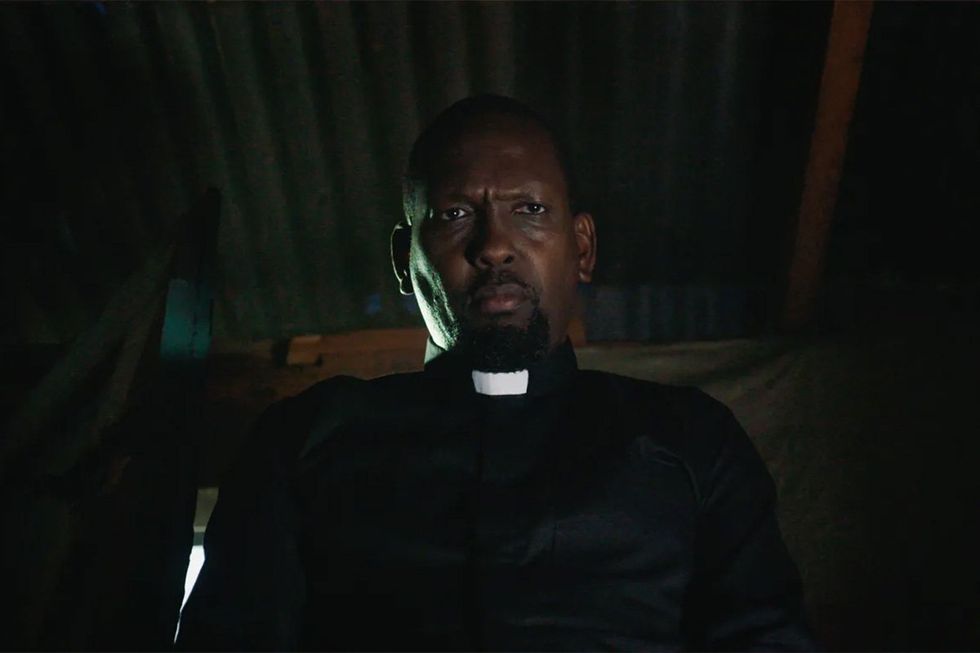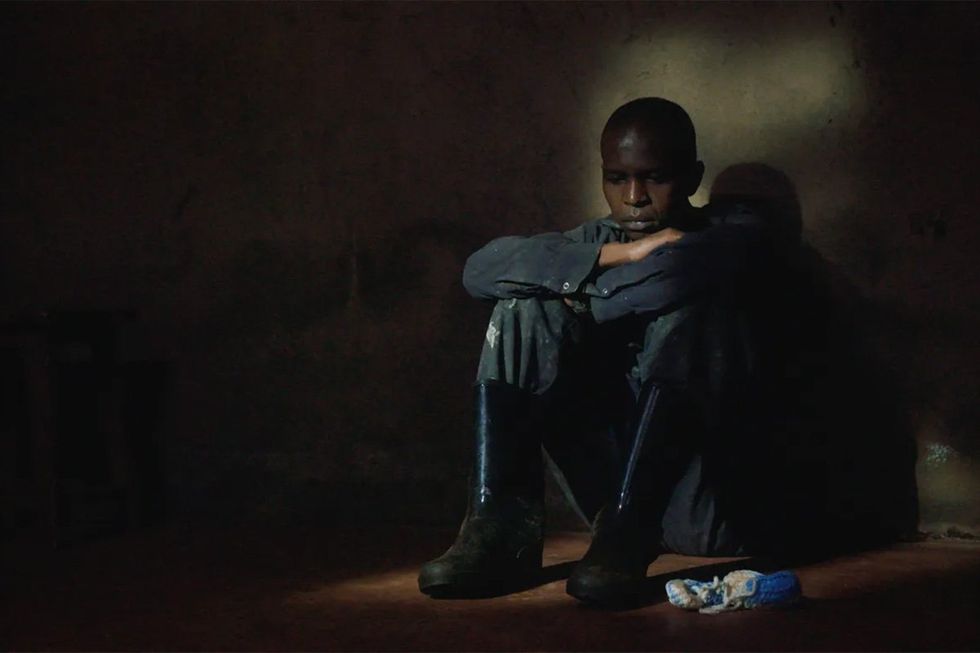In her Debut Film, Angela Wamai Confronts Trauma and Seeks Healing
The Kenyan filmmaker chose to explore the heavy subject of sexual abuse for her first feature but that hasn’t stopped audiences from engaging with the film’s pressing themes.

Justin Mirichii stars in Angela Wamai’s debut feature, ‘Shimoni,’ which won a top prize at Fespaco.
In Shimoni, the accomplished debut feature film by Kenyan filmmaker Angela Wanjiku Wamai, a former schoolteacher, Geoffrey (Justin Mirichii giving a revelatory, intensely layered performance), struggles to reintegrate into society after he is released from prison. Dispatched to the village where he grew up, Geoffrey, who was put away for committing a terrible crime, must begin to reckon head on with the demons from his past.
Shimoni – loosely translated from Swahili as "The Pit" – is a stark but involving drama, shot in ravishing takes and presented with Wamai’s distinct eye for detail and precision. It is a style that she traces back to her successful career as a film editor. Born and raised in Nairobi, Kenya, Wamai attended film school in Havana, Cuba before returning home to set up her professional career. An alumnus of Talents Durban, the Durban FilmMart’s joint development programme with the Berlinale, Wamai has earned editing credits on acclaimed titles such as New Moon directed by Philippa Ndisi-Herrmann and No Simple Way Home by Akuol de Mabior.
Despite the bleakness of its themes, and its confrontation of ethical complexities – or because of these – Shimoni has been a hit on the festival circuit since it first premiered last year at the Toronto International Film Festival (TIFF). The film has had well-received turns at the International Film Festival, Rotterdam and at Fespaco, where Wamai received the Bronze Stallion, the festival’s third prize. It makes its U.S. premiere this weekend at the AFI’s New African Film Festival.
OkayAfrica spoke with Wamai via Zoom about the difficulties of making Shimoni, and the cyclical nature of trauma.
SHIMONI Trailer – 2023 New African Film Festivalwww.youtube.com
How did the idea of Shimoni begin taking shape into a practical film?
It was birthed from this idea of a danger that cannot be avoided, and is demanding to be confronted head on. I worked on the writing for a long time because I was also trying to fundraise at the same time. I only seriously started writing in late 2017, early 2018. By 2019, I had worked with a screenwriting mentor for about six months. In 2020, we got some funding from a local investor but then COVID happened and we couldn’t do anything. We didn’t start pre-production until 2021. Because it is a micro-budget production, we had to figure out a smart way to make the film without killing ourselves in the process.
This meant having a short production process bookended by really long pre- and post-production activities. People were taking on dual or even triple roles, just to make it work. For instance, I knew I could take on the baggage of editing the film. We had about two months of rehearsals and pre-production, six months of post while we shot for about 15 days. It was crazy but we were able to finish in May last year.

It makes sense that you talk about rehearsals because there is a precision with the film that suggests you know exactly what you want to say with each scene.
That is one of the things that comes out of working with a micro budget, you have to be extremely thorough and precise. My style is minimalism, and I guess this comes from my editing background. I do not like cutting, the less I cut the happier I am. I knew we needed to get exactly what we needed ahead of the shoot so we worked with the actors, particularly the lead, Justin [Mirichii] for a long time doing rehearsals.
It is a difficult story, and he needed to be vulnerable. We spent a lot of time just figuring out his emotional palettes in every scene, breaking them down and trying to understand his motivations. We also worked on the storyboard for a long time. The DoP [director of photography], Andrew Mungai, was involved with these conversations. The sound person, as well, so when we were shooting, we knew exactly where the characters were at each moment in time. That is where the precision comes from.
Shimoni captures rural living so acutely; the sense of community, but also the inability to stay out of the next person’s business.
As a filmmaker, I want to avoid cities because we have seen Nairobi enough, let’s move on! I grew up in the city so whenever my mum tells me stories about growing up in the village, it feels like a really nice place with lovely, ordinary-seeming people. But when she really gets into the stories and the gossip, I am like, “Oh my God, so dramatic!” I was interested in how the villagers are so close and connected, and have meetings, and come out to help one another. But there is also this other side that is totally ratchet, and they all know each other’s business. That duality fascinates me.
For ‘Shimoni,’ director Angela Wamai worked with actors, including Justin Mirichii, for two months doing rehearsals to get exactly what she wanted for the shoot.
The church is also particularly influential in rural communities like the one where Shimoni is set, and you do not run away from this.
The film is about sexual abuse. And we cannot ignore the Catholic church’s history, or complicity in this scourge. But beyond religion for a moment, it is often easy to speak out about wrongdoings elsewhere while ignoring similar behavior in our own immediate circles. I wanted to explore the concept of public versus private crimes. With the public crimes, the church is willing to confront them, and we have the Bible and the ten commandments to guide us. But when it comes to a thing like sexual abuse, no one wants to deal with that, and so it stays private.
This I find disingenuous because if I hurt you – physically or emotionally – it is the same thing, you are hurt. I wanted to make that commentary about the church in Africa because I feel like there is an inertia when it comes to dealing with sexual abuse. But I also wanted to avoid the cliché of having the priest be the central perpetrator. Because whether it is the priests being perpetrators or the silence of the church enabling perpetrators, I feel like it is the same hurt.
The story is quite bleak, I must say, do you fear you are going to lose audiences?
I still am quite worried because I know people who come to the movies want to feel some sense of closure, and it is debatable if this film has offered this closure by the end. I spent nine years researching Shimoni, and I recall speaking with a particular survivor about his experience. He was abused at about age eight, and when I spoke with him, he was in his forties, but he was still not in a good place.
His marriage was falling apart, and there was still a lot of trauma there. Thinking about him and all of the other stories I came across, there is a tragedy there in the silence that we embrace as Africans. When we tell people they must never speak about their trauma, that is like negating its existence and denying it ever happened. So I felt it would be very insincere to insert a neat, happy ending.
- The 10 Best African LGBTQ+ Films to Watch This Pride Month ›
- The Best African Films of 2022 ›
- The 10 Best African Netflix Original Films ›
- Filmmaker Ishaya Bako Doesn't Leave Much to Chance - Okayplayer ›

